Enterprise RAG Applications with LlamaIndex

2024-02-29 AGI Builders meetup
What are we talking about?
- What is RAG?
- What is LlamaIndex
- The stages of RAG
- Ingestion
- Indexing
- Storing
- Querying
- Advanced querying strategies x7
- Getting into production
RAG recap
- Retrieve most relevant data
- Augment query with context
- Generate response
A solution to limited context windows
You have to be selective
and that's tricky
Accuracy
RAG challenges:
Faithfulness
RAG challenges:
Recency
RAG challenges:
Provenance
RAG challenges:
How do we do RAG?
1. Keyword search
How do we do RAG?
2. Structured queries
How do we do RAG?
3. Vector search
Vector embeddings
Turning words into numbers
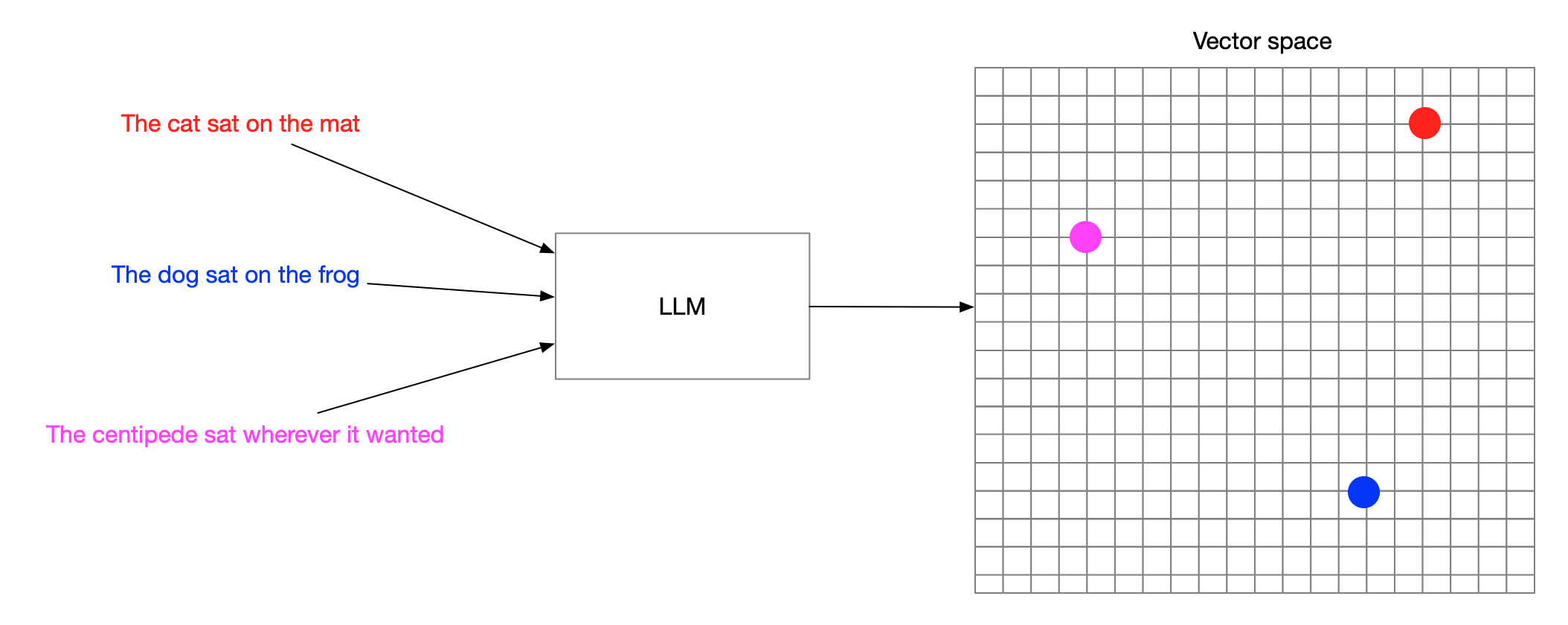
Search by meaning
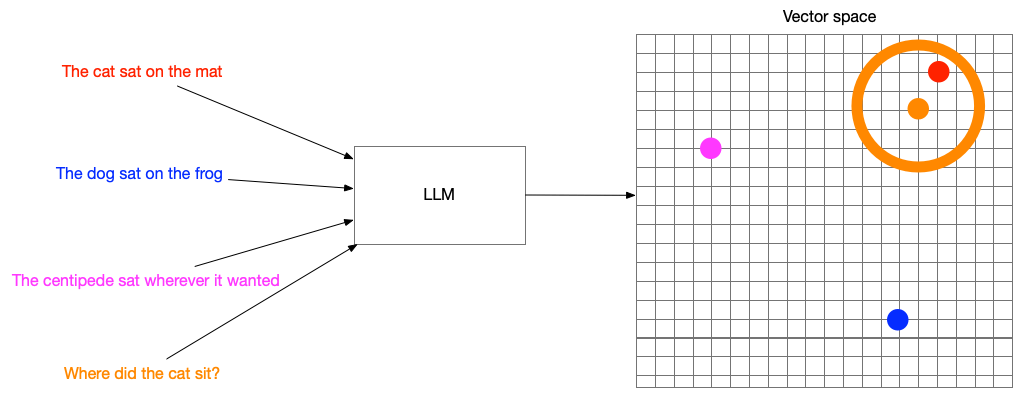
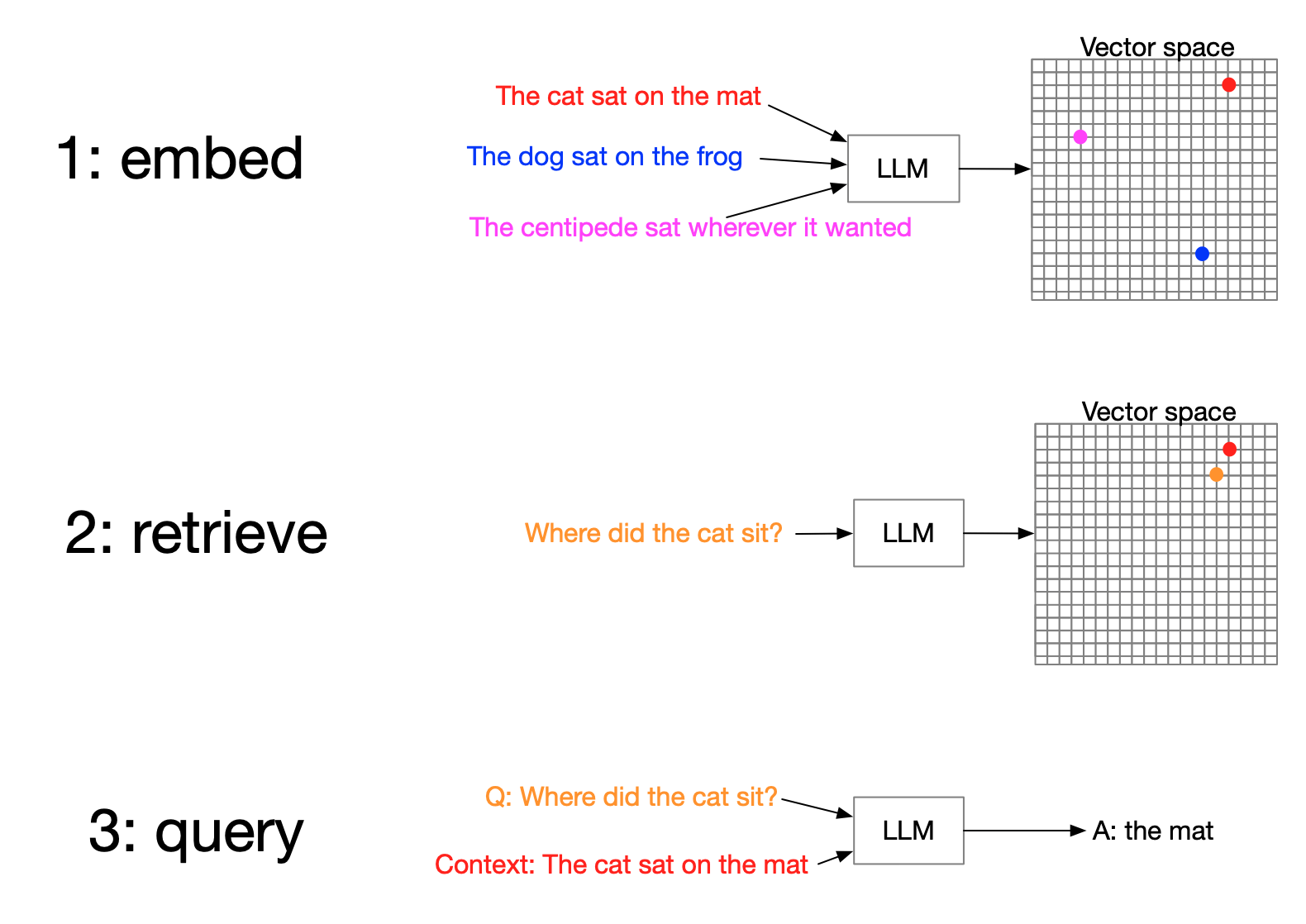
Hybrid approaches
What is LlamaIndex?
- OSS libraries in Python and TypeScript
- LlamaParse - PDF parsing as a service
- LlamaCloud - managed ingestion service
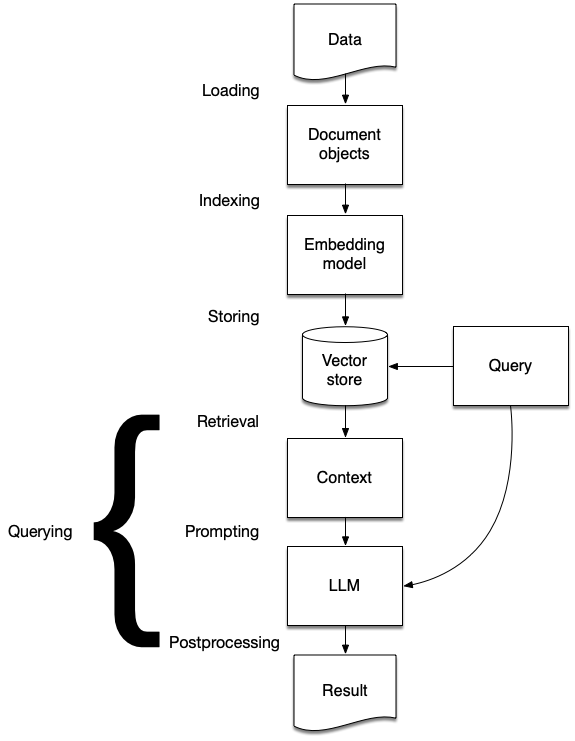





Supported LLMs
Basic ingestion
documents = SimpleDirectoryReader("data").load_data()
index = VectorStoreIndex.from_documents(documents)LlamaHub
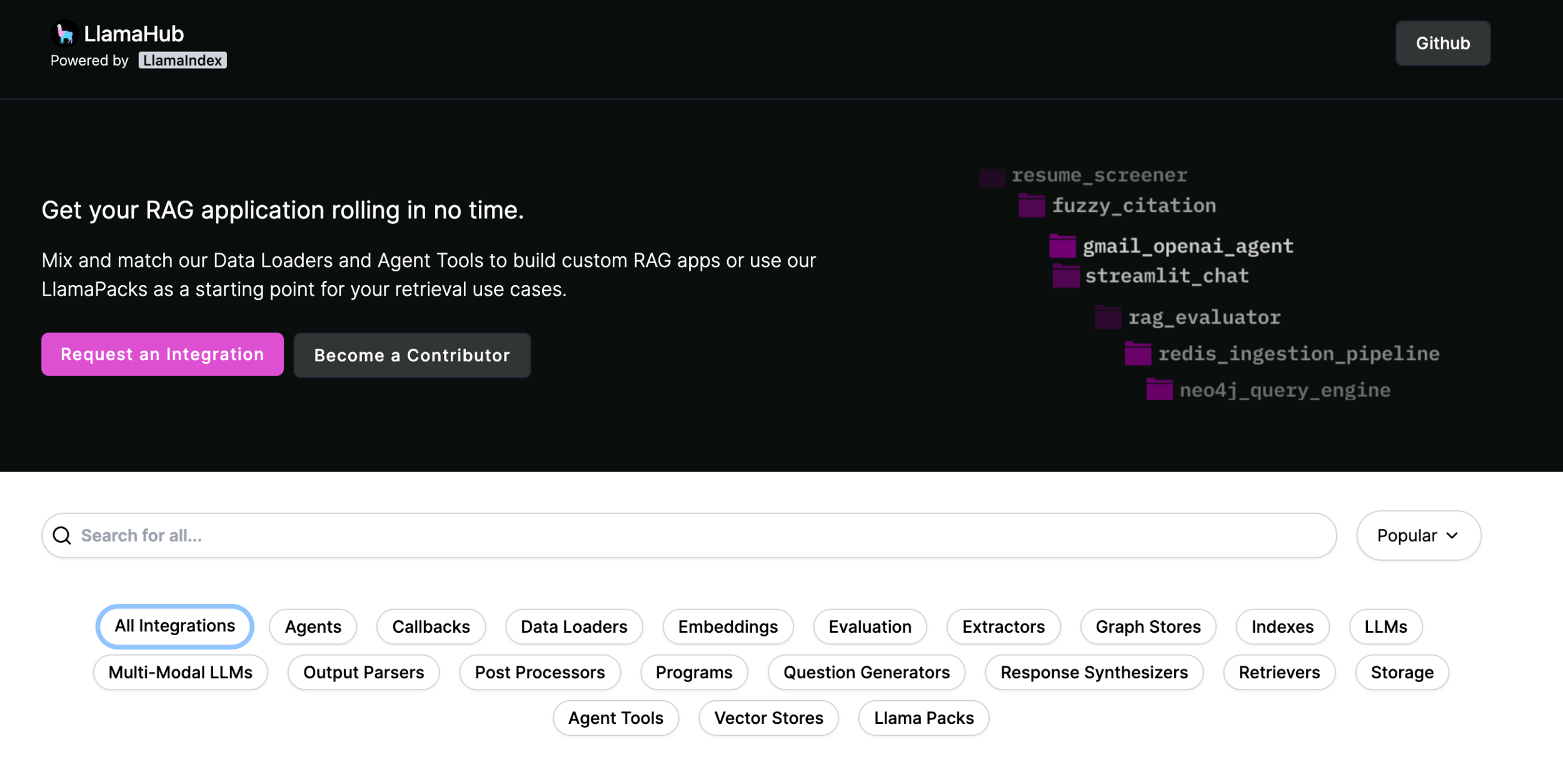
Loading
documents = SimpleDirectoryReader("data").load_data()
index = VectorStoreIndex.from_documents(documents)Ingestion pipeline
# create the pipeline with transformations
pipeline = IngestionPipeline(
transformations=[
SentenceSplitter(chunk_size=25, chunk_overlap=0),
TitleExtractor(),
OpenAIEmbedding(),
]
)
# run the pipeline
nodes = pipeline.run(
documents=SimpleDirectoryReader("data").load_data()
)
index = VectorStoreIndex(nodes)Ingestion caching
# save
pipeline.persist("./pipeline_storage")
# load and restore state
new_pipeline = IngestionPipeline(
transformations=[
SentenceSplitter(chunk_size=25, chunk_overlap=0),
TitleExtractor(),
],
)
new_pipeline.load("./pipeline_storage")
# will run instantly due to the cache
nodes = pipeline.run(
documents=SimpleDirectoryReader("data").load_data()
)
index = VectorStoreIndex(nodes)Supported embedding models
- OpenAI
- Langchain
- CohereAI
- Qdrant FastEmbed
- Gradient
- Azure OpenAI
- Elasticsearch
- Clarifai
- LLMRails
- Google PaLM
- Jina
- Voyage
...plus everything on Hugging Face!
VectorStoreIndex
KnowledgeGraphIndex
Supported Vector databases
- Apache Cassandra
- Astra DB
- Azure Cognitive Search
- Azure CosmosDB
- ChatGPT Retrieval Plugin
- Chroma
- DashVector
- Deeplake
- DocArray
- DynamoDB
- Elasticsearch
- FAISS
- LanceDB
- Lantern
- Metal
- MongoDB Atlas
- MyScale
- Milvus / Zilliz
- Neo4jVector
- OpenSearch
- Pinecone
- Postgres
- pgvecto.rs
- Qdrant
- Redis
- Rockset
- SingleStore
- Supabase
- Tair
- TencentVectorDB
- Timescale
- Typesense
- Weaviate
Querying
We don't talk about prompting (much)
See prompts
query_engine = index.as_query_engine()
prompts_dict = query_engine.get_prompts()Modify prompts
# shakespeare!
qa_prompt_tmpl_str = (
"Context information is below.\n"
"---------------------\n"
"{context_str}\n"
"---------------------\n"
"Given the context information and not prior knowledge, "
"answer the query in the style of a Shakespeare play.\n"
"Query: {query_str}\n"
"Answer: "
)
qa_prompt_tmpl = PromptTemplate(qa_prompt_tmpl_str)
query_engine.update_prompts(
{"response_synthesizer:text_qa_template": qa_prompt_tmpl}
)Basic querying
query_engine = index.as_query_engine()
response = query_engine.query(
"What is the capital of South Dakota?"
)
print(response)Configure retriever
index = VectorStoreIndex.from_documents(documents)
retriever = VectorIndexRetriever(
index=index,
similarity_top_k=5,
)
response_synthesizer = get_response_synthesizer(
response_mode="tree_summarize",
)
query_engine = RetrieverQueryEngine(
retriever=retriever,
response_synthesizer=response_synthesizer,
)
response = query_engine.query(
"What is the capital of South Dakota?"
)
print(response)Configure synthesizer
index = VectorStoreIndex.from_documents(documents)
retriever = VectorIndexRetriever(
index=index,
similarity_top_k=5,
)
response_synthesizer = get_response_synthesizer(
response_mode="tree_summarize",
)
query_engine = RetrieverQueryEngine(
retriever=retriever,
response_synthesizer=response_synthesizer,
)
response = query_engine.query(
"What is the capital of South Dakota?"
)
print(response)Create query engine
index = VectorStoreIndex.from_documents(documents)
retriever = VectorIndexRetriever(
index=index,
similarity_top_k=5,
)
response_synthesizer = get_response_synthesizer(
response_mode="tree_summarize",
)
query_engine = RetrieverQueryEngine(
retriever=retriever,
response_synthesizer=response_synthesizer,
)
response = query_engine.query(
"What is the capital of South Dakota?"
)
print(response)Advanced query strategies
SubQuestionQueryEngine
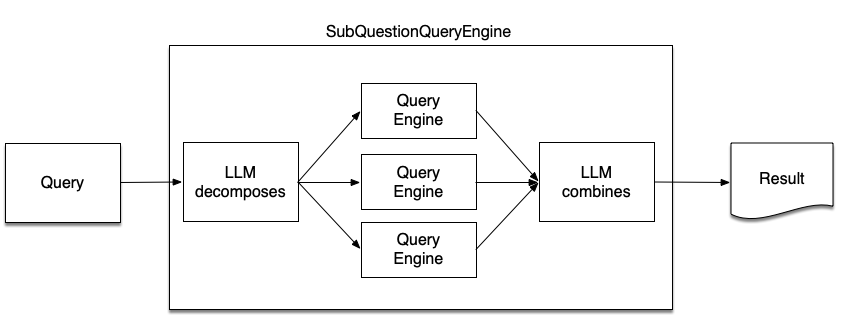
SubQuestionQueryEngine
# setup base query engine as tool
query_engine_tools = [
QueryEngineTool(
query_engine=simple_query_engine,
metadata=ToolMetadata(
name="pg_essay",
description="Paul Graham essay on What I Worked On",
),
),
]
query_engine = SubQuestionQueryEngine.from_defaults(
query_engine_tools=query_engine_tools
)Problems with precision
Small-to-big retrieval
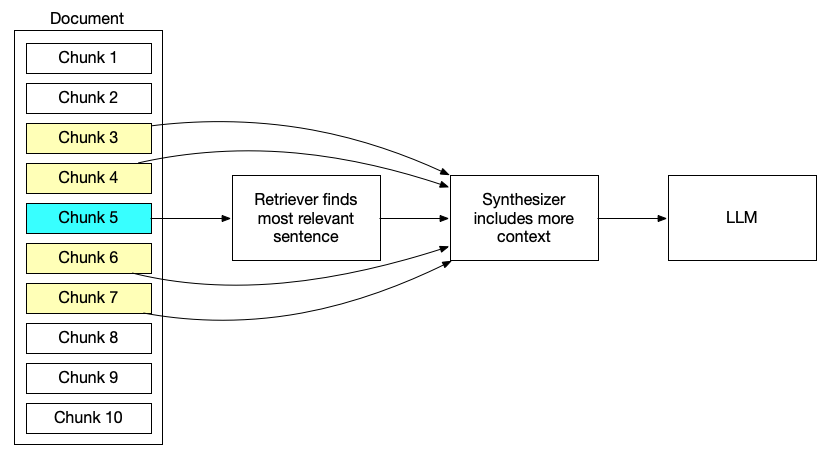
Small-to-big retrieval
query_engine = index.as_query_engine(
similarity_top_k=2,
node_postprocessors=[
MetadataReplacementPostProcessor(target_metadata_key="window")
],
)
response = query_engine.query(
"What happened on August 3rd?"
)
print(response)Precision through preprocessing
Metadata filtering
query_engine = index.as_query_engine(
filters=MetadataFilters(
filters=[ExactMatchFilter(key="year", value="2021")]
)
)
response = query_engine.query(
"What was the annual profit in 2021?"
)
print(response)Auto-retrieval
vector_store_info = VectorStoreInfo(
content_info="Brief summary of a movie",
metadata_info=[
MetadataInfo(
name="year",
description="The year the movie was released",
type="integer",
),
MetadataInfo(
name="director",
description="The name of the movie director",
type="string",
),
],
)
retriever = VectorIndexAutoRetriever(
index, vector_store_info=vector_store_info
)Metadata support
- Apache Cassandra
- Astra DB
- Chroma
- DashVector
- Deeplake
- DocArray
- Elasticsearch
- LanceDB
- Lantern
- Metal
- MongoDB Atlas
- MyScale
- Milvus / Zilliz
- OpenSearch
- Pinecone
- Postgres
- pgvecto.rs
- Qdrant
- Redis
- Simple
- SingleStore
- Supabase
- Tair
- TencentVectorDB
- Timescale
- Typesense
- Weaviate
Hybrid Search
Hybrid search
query_engine = index.as_query_engine(
vector_store_query_mode="hybrid",
similarity_top_k=2,
alpha=0.5
)
response = query_engine.query(
"What did the author do growing up?",
)Hybrid search support
- Azure Cognitive Search
- Elasticsearch
- Lantern
- MyScale
- Pinecone
- Postgres
- pgvecto.rs
- TencentVectorDB
- Weaviate
Complex document strategies
PandasQueryEngine
reader = PyMuPDFReader()
table_dfs = #...parse tables into pandas structures...
df_query_engines = [
PandasQueryEngine(table_df)
for table_df in table_dfs
]IndexNodes
# define index nodes
summaries = [
(
"This node provides information about the world's richest billionaires"
" in 2023"
),
(
"This node provides information on the number of billionaires and"
" their combined net worth from 2000 to 2023."
),
]
df_nodes = [
IndexNode(text=summary, index_id=f"pandas{idx}")
for idx, summary in enumerate(summaries)
]
df_id_query_engine_mapping = {
f"pandas{idx}": df_query_engine
for idx, df_query_engine in enumerate(df_query_engines)
}Sub-Retriever
doc_nodes = service_context.node_parser.get_nodes_from_documents(docs)
vector_index = VectorStoreIndex(doc_nodes + df_nodes)
vector_retriever = vector_index.as_retriever(similarity_top_k=1)RecursiveRetriever
recursive_retriever = RecursiveRetriever(
"vector",
retriever_dict={"vector": vector_retriever},
query_engine_dict=df_id_query_engine_mapping,
)
response_synthesizer = get_response_synthesizer()
query_engine = RetrieverQueryEngine.from_args(
recursive_retriever, response_synthesizer=response_synthesizer
)
response = query_engine.query(
"What's the net worth of the second richest billionaire in 2023?"
)
Text to SQL
SQLDatabase
engine = create_engine("sqlite:///:memory:")
sql_database = SQLDatabase(
engine,
include_tables=["city_stats"]
)Querying SQLDatabase
query_engine = NLSQLTableQueryEngine(
sql_database=sql_database,
tables=["city_stats"],
)
query_str = "Which city has the highest population?"
response = query_engine.query(query_str)SQLTableRetrieverQueryEngine
table_node_mapping = SQLTableNodeMapping(sql_database)
table_schema_objs = [
(SQLTableSchema(table_name="city_stats"))
]
obj_index = ObjectIndex.from_objects(
table_schema_objs,
table_node_mapping,
VectorStoreIndex,
)
query_engine = SQLTableRetrieverQueryEngine(
sql_database, obj_index.as_retriever(similarity_top_k=1)
)Manually add table metadata
city_stats_text = (
"This table gives information regarding the population and country of a"
" given city. The user will query with codewords, where 'foo' corresponds"
" to population and 'bar'corresponds to city."
)
table_node_mapping = SQLTableNodeMapping(sql_database)
table_schema_objs = [
(SQLTableSchema(table_name="city_stats", context_str=city_stats_text))
]Multi-document agents
SECinsights.ai
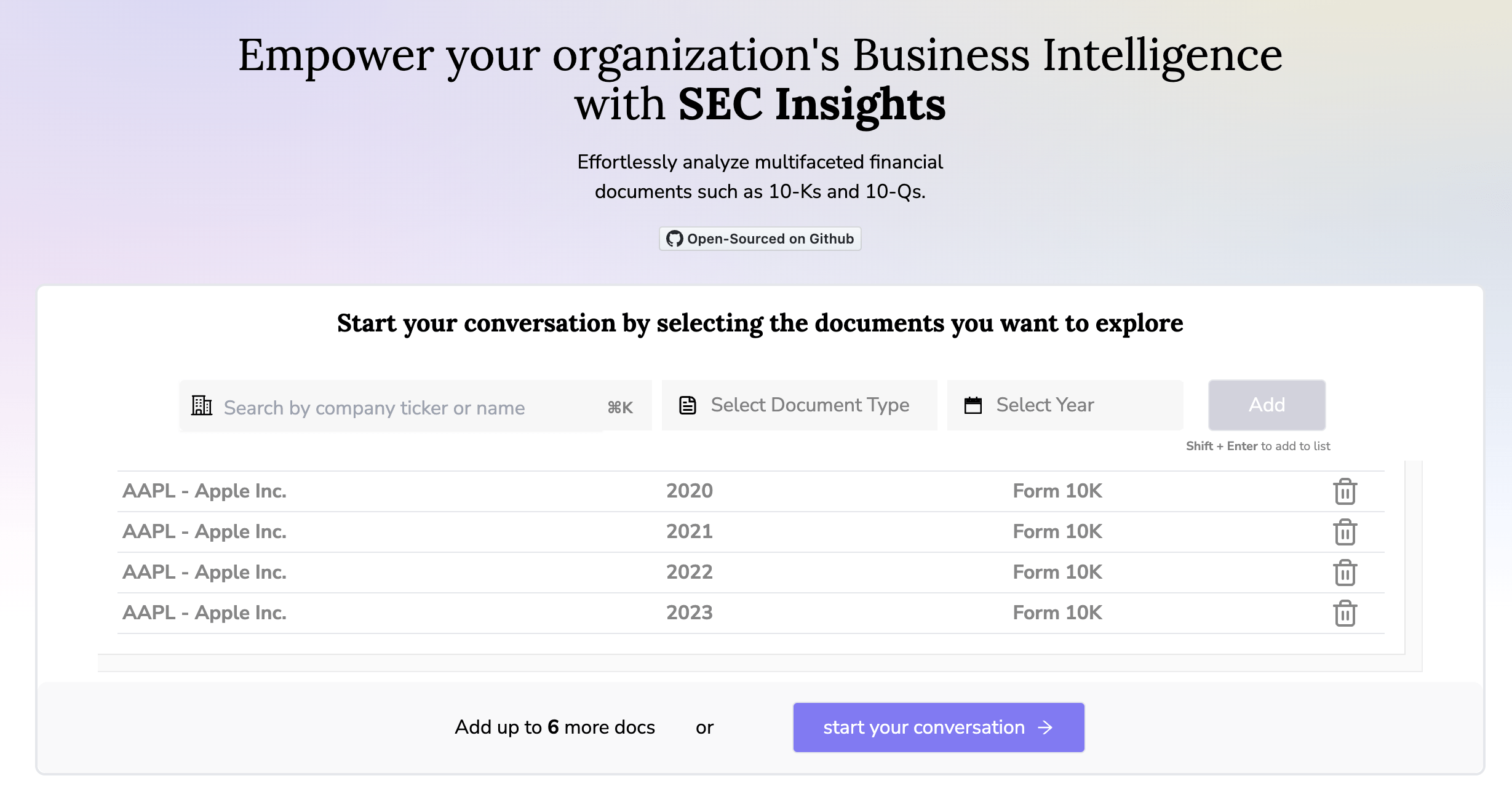
Create query engines
documents = SimpleDirectoryReader("2020").load_data()
index2020 = VectorStoreIndex.from_documents(documents)
query_engine_2020 = index2020.as_query_engine()
documents = SimpleDirectoryReader("2021").load_data()
index2021 = VectorStoreIndex.from_documents(documents)
query_engine_2021 = index2021.as_query_engine()
documents = SimpleDirectoryReader("2022").load_data()
index2022 = VectorStoreIndex.from_documents(documents)
query_engine_2022 = index2022.as_query_engine()Define tools
query_engine_tools = [
QueryEngineTool(
query_engine=query_engine_2020,
metadata=ToolMetadata(
name="2020_facts_tool",
description=(
"Contains facts about filings "
"about the company from the year 2020"
),
),
),
# ... etc ...
]Define agent
function_llm = OpenAI(model="gpt-4")
agent = OpenAIAgent.from_tools(
query_engine_tools,
llm=function_llm,
system_prompt=f"""\
You are a specialized agent designed to answer queries about financial filings.
You must ALWAYS use at least one of the tools provided when answering a question; do NOT rely on prior knowledge.\
""",
)Composability
"2024 is the year of LlamaIndex in production"
– Shawn "swyx" Wang, Latent.Space podcast
npx create-llama
LlamaIndex in production
- Datastax
- OpenBB
- Springworks
- Gunderson Dettmer
- Jasper
- Replit
- Red Hat
- Clearbit
- Berkeley
- W&B
- Instabase
- Adyen
Case study:
Gunderson Dettmer

Recap
- What LlamaIndex is
- Orchestration
- LlamaParse
- LlamaCloud
- A registry of software
- A path to production
- Stages of RAG
- Ingestion
- Indexing
- Storing
- Querying
Advanced retrieval strategies
- SubQuestionQueryEngine
- Small-to-big retrieval
- Metadata filtering
- Hybrid search
- Recursive retrieval
- Text-to-SQL
- Multi-document agents
What next?

Follow me on twitter: @seldo
Enterprise RAG applications
By Laurie Voss
Enterprise RAG applications
- 1,387



